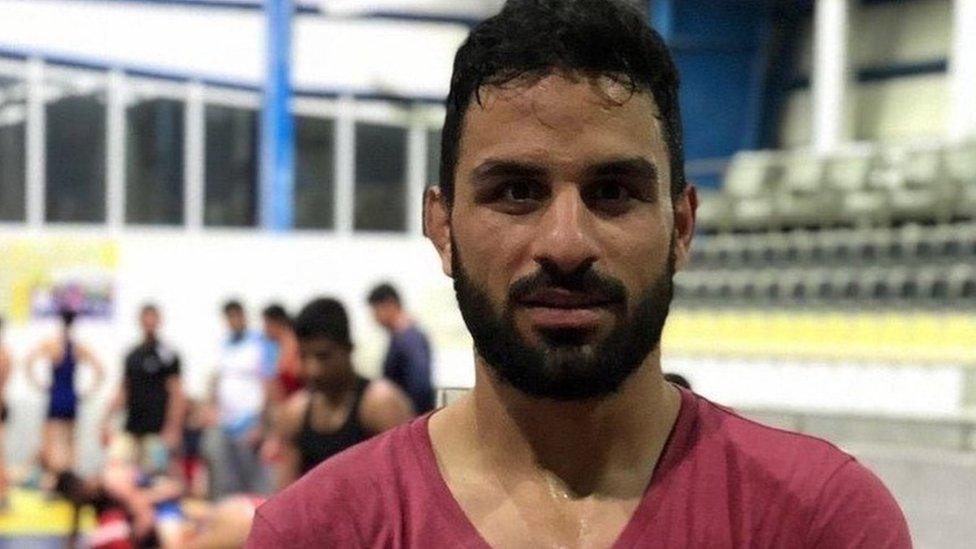Iran prisoner spends 1,000 days in solitary confinement
- Published
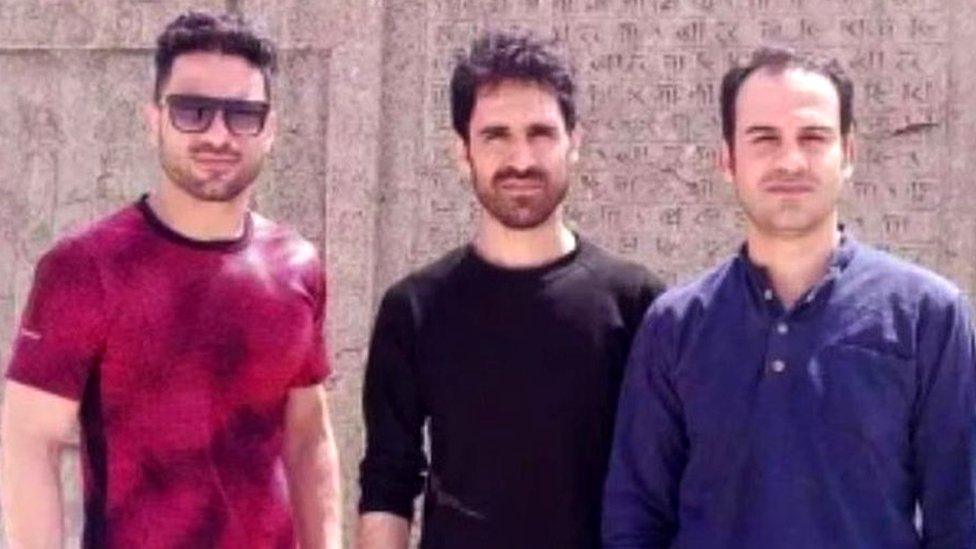
Navid Afkari (left), Vahid (centre), and Habib (right) said they were falsely accused
Amnesty International is calling for the release of an Iranian man who is spending his 1,000th day in solitary confinement in jail.
Vahid Afkari, 37, was convicted, along with his two brothers, of murdering a security officer during protests over the cost of living five years ago.
One of the brothers, champion wrestler Navid, was executed. The other brother, Habib, was released last year amid international pressure.
All three denied the accusations and said they were tortured to make them confess.
Despite harsh crackdowns on anti-government protesters down the years in Iran, it is rare for the authorities to hold someone in a prison cell on their own for so long.
"Every time the family visit Vahid in prison they try to support him, but he raises their spirits instead," a source close to the family told the BBC.
The Afkari family's troubles started a few years ago in their hometown of Shiraz, in the southern province of Fars.
People were protesting against rising prices and shrinking salaries. The three brothers were among those who took to the streets.
Vahid and Navid were arrested in September 2018, while Habib was arrested three months later.
Navid, the youngest, was well known for his sport. This marked him out for the harshest penalty from the authorities.
He was sentenced to death, while Vahid and Habib were initially sentenced to 54 years and 25 years in prison respectively.
The BBC has verified dozens of documents which show that the Afkari brothers complained to the judicial authorities about being tortured to confess while in custody.
An audio message from Navid was shared on social media in August 2020.
"There is not one shred of evidence in this damned case which proves I'm guilty," he said in the message. "I realise they are looking for a neck for their noose." This phrase later went viral.
The same month, a voice note from Vahid was smuggled out of Adel Abad prison in Shiraz, where they were all being held.
"I went on two hunger strikes for 20 days each, hoping that my voice would be heard but it didn't happen," said Vahid. "Eventually, I tried to take my life due to the mental and psychological torture I had endured."
'A black hole'
According to the source, the three brothers - from a family of five boys and one girl - were raised in a loving environment even though money was tight.
"They got so much joy out of being together, the simplest things were the most exhilarating," the source said.
Vahid and Habib were top students and attended university. Vahid never placed any burden on his mother.
"She was always worrying if he had enough to eat," said the source.
Vahid became a plasterer after college because there were no jobs.
Meanwhile, Habib and Navid, as the two youngest, were always close and frequently got up to mischief.
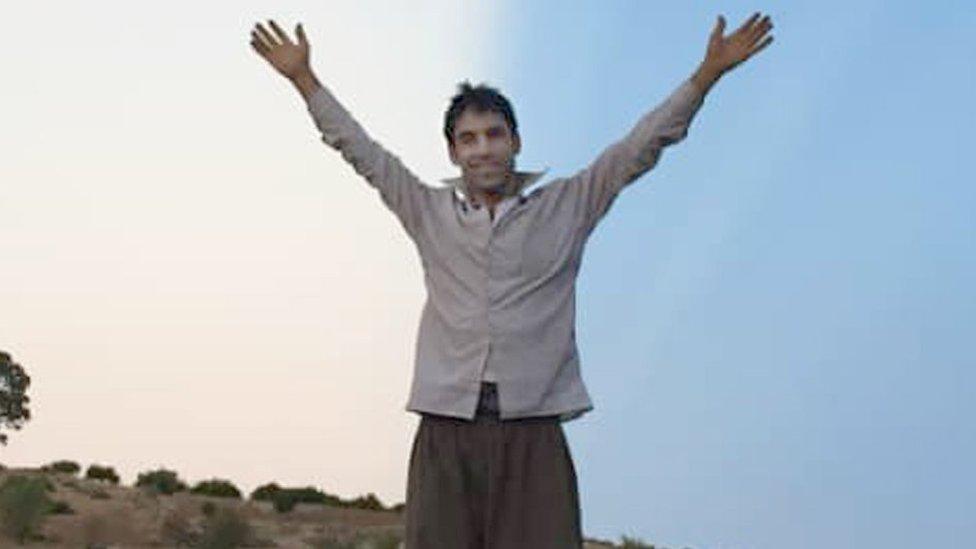
Vahid Afkari should never have been jailed, says Amnesty International
When Navid started winning trophies as a wrestler, he never boasted about his success.
"Their mother would stumble upon new championship plaques hidden in his closet," said the source.
In September 2020, the three brothers were badly beaten in prison and placed in underground cells beside the execution chamber, the source said. The cells were unlit with no windows, beds or blankets - just a toilet and sink in the corner.
Prisoners enter the cells naked and are given a previously worn uniform, often covered in blood from beatings or self-harm. A former prisoner told the BBC "to visualise a black hole like you might see in the movies". The brothers were also blindfolded.
"You're handcuffed and your ankles are cuffed. Because of the cold, metal cuffs become razor sharp. The pain is so bad you're forced to lie on your chest," the former prisoner added.
Before sunrise on 22 September 2020, Vahid and Habib heard the hanging mechanism being operated.
A few minutes later, a guard entered their cells and said: "Condolences." Their baby brother Navid was hanged at the age of 27. The campaign inside and outside Iran to stop his execution had failed.
'Afraid, but not guilty'
After Navid's execution, the authorities continued to pile pressure on his two imprisoned brothers. They were not allowed visits or even a phone call for weeks, and the family didn't know if they were still alive.
When the Afkari family was finally allowed to visit, they realised that Vahid was under even more pressure to incriminate himself and Habib.
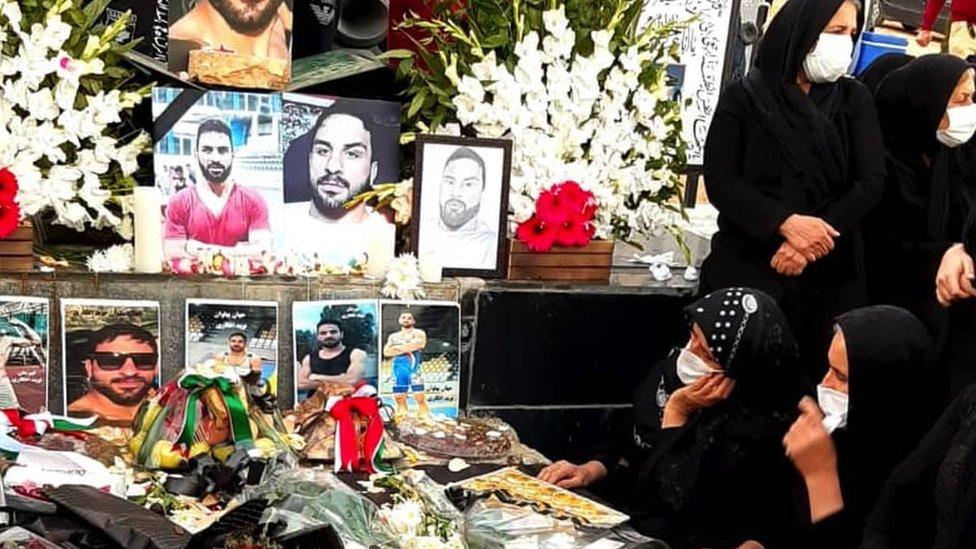
Navid's grave, covered with flowers, one month after his execution in October 2020
According to the source, Vahid was told he would be released if he confessed to the murder. If he didn't, Habib would be executed in front of him. Vahid said he adored Habib but that they were innocent.
The officials then asked Vahid if he was scared of dying. He replied: "I'm afraid, but I'm not guilty."
Habib was eventually released in March 2022 after international pressure.
Vahid is still in solitary confinement. He is reportedly in good spirits and exercises in his cell every day. An international campaign has been mobilised to seek his release.
"Vahid Afkari should never have spent a single day in prison, let alone years unjustly jailed and 1,000 days in solitary confinement. He must be immediately released," Amnesty International said in a statement.
Navid's grave still has no proper headstone. The last time the family attempted to erect one, it was bulldozed by the authorities.
Related topics
- Published18 January 2023
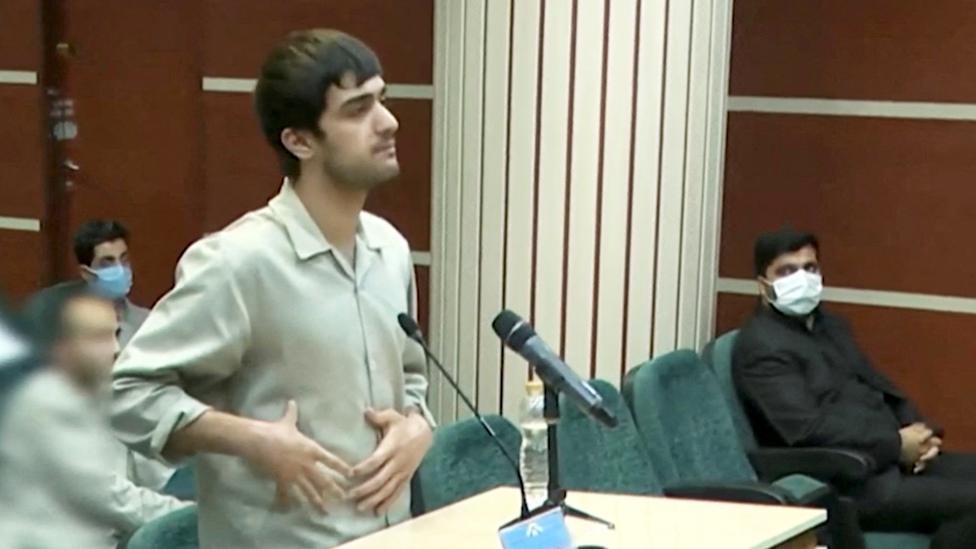
- Published12 September 2020
